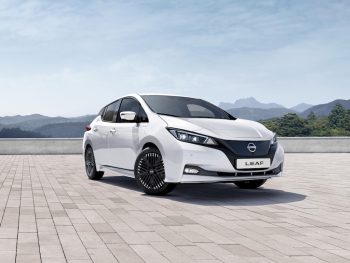Nissan ends Leaf production in UK
Nissan has pulled the plug on Sunderland production of its current Leaf electric car, ahead of the 2026 arrival of its successor.
The pioneering Leaf originally launched in 2010 as the world’s first mass-market electric vehicle, but now bows out in its current form.
It’ll return in 2026 at Sunderland as an all-new version, based on the Chill-Out Concept unveiled in 2021, and accompanied by the first fully electric versions of Nissan’s Qashqai and Juke crossovers on the production lines.
A Nissan spokesperson said: “After 13 years of great success, the current generation of Nissan Leaf, the world’s first mass-market 100% electric vehicle, is approaching the end of its life cycle in Europe.
“Depending on the market’s inventory, European customers will be able to place their orders until vehicle stocks run out.
“Nissan has already announced a new line-up of 100% electric vehicles for the European market to be produced by the Sunderland plant as part of our commitment to sustainability and electrification.’
Production will continue in the US and Japan, but European buyers won’t be able to get their hands on those. However, in the UK, Nissan has said that the model remains on sale, with good supply in 2024.
Ex-Nissan chief operating officer Andy Palmer, who led the development of the original Leaf, criticised the break in UK Leaf production.
Speaking to Electrifying.com, he said: “In a market that has a long-term trajectory towards mass EV adoption, it’s disappointing to see that an innovator in the space hasn’t been able to invest in a way that allows continuity of production.”
In autumn 2023, Nissan confirmed that all its new cars in Europe from now will be fully electric, and that it expects its passenger car line-up in Europe to be 100% electric by 2030.
It’s transforming its Sunderland plant into a flagship electric vehicle hub, intended to provide a blueprint for carmakers and combining electric vehicles, renewable energy and battery production. Its “transformational” EV36Zero hub will include two new gigafactories alongside the existing battery plant, owned and run by AESC.


